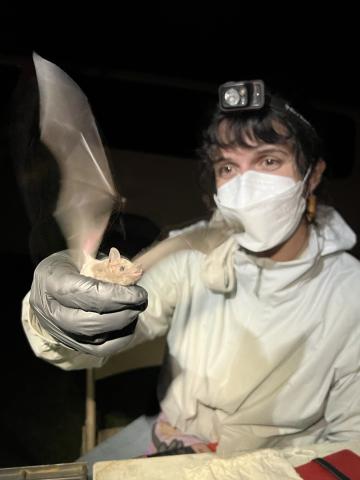Mallory Davies
she/her
Research Scientist II
Stoner Lab

-
Fort Collins, CO
Research
My research focuses on the three nectar bats that persist in the United States, the lesser long-nosed bat (Leptonycteris yerbabuenae), the Mexican long-nosed bat (Leptonycteris nivalis), and the Mexican long-tongued bat (Choeronycteris mexicana). Working with Dr. Kathryn Stoner, we investigate how factors such as climate, agave nectar availability, and the availability of anthropogenic food sources such as sugar water from hummingbird feeders affect the movement and timing of nectar bats in southwestern New Mexico and southeastern Arizona. Our field team is based out of Hachita, NM, where we study New Mexico’s largest know lesser-long nosed bat roost site located in the Big Hatchet Mountains and monitor their activity in nearby residential sites.
Teaching
While at Colorado State University I was the instructor for FW375, Wildlife Field Studies. This was a discussion and field trip course aimed at giving students opportunities to interact with wildlife professionals in the field and experience field work first hand. I was also a graduate teaching assistant for FW 471, Wildlife Data Collection and Analysis, where students would collect data in the field and learn how to process and analyze the data using software such as program MARK and R. Lastly, while at CSU I was a graduate teaching assistant for NR 300, Biological Diversity, where we covered broad topics such as conservation biology, conservation genetics, island biogeography, etc.
Degrees
- Ph.D. Fish, Wildlife, and Conservation Biology, Anticipated Graduation: December 2024, Colorado State University, Fort Collins, CO
- B.S. Wildlife Biology, 2015, University of Montana, Missoula, MT

